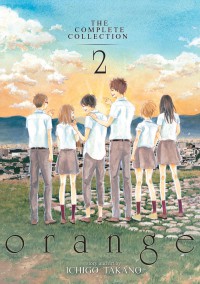Familiar Diversions
I'm a librarian who loves anime, manga, and reading a wide variety of genres.
Currently reading
Orange: The Complete Collection (manga, vol. 2) by Ichigo Takano, translated by Amber Tamosaitis

Warning: this manga deals with depression and suicide. You've probably already read the first volume and know that, but this volume goes into more detail and includes a lengthy section from the POV of a character up to the moment he makes his decision to commit suicide.
I enjoyed this but had some issues with it that I’m not sure I can articulate. Well, I’ll give it a shot.
Orange is only the first two thirds of this volume. The last third is an unrelated story with a completely different tone. I’ll discuss them separately in this review.
Orange:
This volume picks up right where the first one left off. Naho is still trying to save Kakeru, but now she knows she isn’t alone - literally all of her friends also received letters from their future/parallel universe selves and are also working to save him. Things have changed enough now that the letters don’t always help, although they can still provide a little bit of guidance. But will it be enough? And will Naho and her friends’ efforts really manage to save Kakeru?
One of the things that worried me about the previous volume was the possibility that Takano might be taking the story into “high school romance saves Kakeru” territory. That worry never quite went away - although Takako thought that Kakeru would be fine even if his romance with Naho didn’t work out, Suwa was so unconvinced by this that he continued to sabotage the future he knew he could have with Naho. That said, the way the ending was written indicated that it was everyone, not just Naho, who was necessary to save Kakeru. What he needed wasn’t specifically romance, but rather relationships with people who cared about him, worried about him, and thought about him enough to try to stand by him through everything, even when he actively pushed them away.
Which brings me to the thing I’ve been avoiding writing directly about: suicide. While I think Orange is very good, it feels like something that was written more for people like Naho, Suwa, Takako, Hagita, and Azu than people like Kakeru and his mother. The section from Kakeru’s POV is part of the reason why.
At one point in the volume, Takano includes a flashback to Kakeru’s POV in the original timeline -
I probably wouldn’t recommend this series to someone who was dealing with depression and/or suicidal feelings unless they had someone they could go to that they felt comfortable talking to. The ending
When I first started this series, I said that it could maybe be considered science fiction. After reading this volume, I take that back: it definitely isn’t science fiction, despite its occasional passages about parallel universes. Takano’s explanation for how Naho and her friends managed to send their letters back in time and start a parallel universe where Kakeru doesn’t die was absolutely ridiculous. Rather than coming up with some kind of brilliant plan to save Kakeru, they
Haruiro Astronaut:
Chiki and Mami are identical twins. Mami’s the cute one that guys are always asking out. Since she can never bring herself to say “no” to any of them, even if she isn’t interested in them, Chiki always ends up being the one to break up with them for Mami. And then they ask her out because they view the twins as interchangeable. Chiki wants to find someone who sees her for who she is, rather than as an acceptable substitute for Mami, and who wants to be with her.
Mami introduces Chiki to Yui, a hot new guy in her class, and Chiki falls head over heels in love. Unfortunately for her, he’s interested in Mami. As if the situation weren’t already painful enough, Mami starts to fall for him too. So where does that leave Chiki?
This one’s light and fluffy tone was a welcome change after finishing Orange. The worst thing the characters had to worry about was whether the person they liked happened to like someone else.
This story had not one, but two love triangles: the one mentioned in my summary, involving Chiki, Mami, and Yui, and one involving Chiki, Yui’s best friend, and a guy who initially says he’s interested in Mami. To my surprise, I actually kind of liked these love triangles. Although they both had aspects that were painful for the characters, neither one got to the point of truly hurting anybody and wrecking friendships. I’m still not sure how I feel about the final pairings, but the fact that everyone could still talk to each other and have fun together after everything was said and done was really refreshing.
(And I wonder, am I the only one who looked at that last page and had a sudden vision of Chiki, Tatsuaki, and Natsuki all going on a date together? Natsuki would quietly and happily soak up the atmosphere, Tatsuaki would be overly loud in a failed effort to hide his nervousness, and Chiki would blush and laugh.)
Rating Note:
If this volume had included the end of Orange and nothing else, I might have given it 3.5 stars. Something about the way Takano wrote about Kakeru and his mother's depression didn't quite sit well with me - I don't think I've figured out exactly what bothered me, but I don't know that I care to spend more time digging into it either.
Haruiro Astronaut really was a breath of fresh air and managed to nudge my rating up to 4 stars, which is a bit funny considering that I probably wouldn't have given it that rating if I'd read it on its own.
(Original review posted on A Library Girl's Familiar Diversions.)












